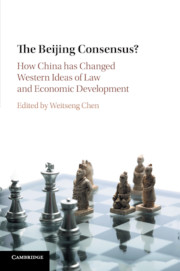Book contents
- Frontmatter
- Contents
- Figures
- Contributors
- Acknowledgments
- Introduction: Debating the Consensuses
- PART I Deconstructing the Beijing Consensus
- PART II Examining the Beijing Consensus in Context
- 4 The Legal Maladies of “Federalism, Chinese Style”
- 5 Lessons from Chinese Growth: Rethinking the Role of Property Rights in Development
- 6 Size Matters? Renminbi Internationalization and the Beijing Consensus
- 7 A Chinese Model for Tax Reforms in Developing Countries?
- 8 The Chinese Model for Securities Law
- PART III Revisiting the Beijing Consensus
- Bibliography
- Index
7 - A Chinese Model for Tax Reforms in Developing Countries?
from PART II - Examining the Beijing Consensus in Context
Published online by Cambridge University Press: 28 April 2017
- Frontmatter
- Contents
- Figures
- Contributors
- Acknowledgments
- Introduction: Debating the Consensuses
- PART I Deconstructing the Beijing Consensus
- PART II Examining the Beijing Consensus in Context
- 4 The Legal Maladies of “Federalism, Chinese Style”
- 5 Lessons from Chinese Growth: Rethinking the Role of Property Rights in Development
- 6 Size Matters? Renminbi Internationalization and the Beijing Consensus
- 7 A Chinese Model for Tax Reforms in Developing Countries?
- 8 The Chinese Model for Securities Law
- PART III Revisiting the Beijing Consensus
- Bibliography
- Index
Summary
Effective taxation is essential for achieving sustained growth in third world countries as many lack adequate financial resources to provide basic public goods. Advice from international development agencies has recently shifted away from the Washington Consensus toward a model that stresses institutional building and contextualized tax policy making and implementation. Against that backdrop, this chapter reviews the tax reforms in China for the past three decades, explores their structural determinants, and attempts to draw lessons for the least developed countries seeking to strengthen their extractive capacity. The review indicates that in reforming its tax system, the Chinese government engages in constant pluralistic learning, target setting, and making incremental changes based on trial and error. The Chinese Model of tax reform, however, may not be broadly transferable as most other developing countries do not share its structural premise. Moreover, the model loses much of its glamour if examined from a comparative perspective. Nonetheless, the Chinese experience sheds light on several key questions regarding tax reforms in the least developed countries such as the role of the state, the importance of timing, and priority setting in institutional building.
The Tax Components of the Consensuses
The Washington Consensus, when originally conceived, enshrined three basic policy tenets: “a market economy, openness to the world, and macroeconomic discipline.” Yet over time it took on a tone of market fundamentalism and inspired policy prescriptions for developing countries that emphasize predominantly economic liberalization. The market-centered campaign, however, gradually lost its momentum. Critics of the Washington Consensus observed that countries normally underperformed after blindly adopting the liberalization policies; some even questioned the enterprise of providing development policy agenda based on international best practices as “appropriate growth policies are almost always context specific.”
As the Washington Consensus lost its appeal, scholars seeking a new development model naturally looked to China, the economy of which sustained remarkable growth despite policy deviations from market fundamentalism. The term Beijing Consensus was coined to encapsulate a development approach of “groping for stones to cross the river,” and was later interpreted as stressing “the importance of second-best solutions, the need for experimentation and the diversity of possible end states.”
- Type
- Chapter
- Information
- The Beijing Consensus?How China Has Changed Western Ideas of Law and Economic Development, pp. 176 - 202Publisher: Cambridge University PressPrint publication year: 2017



